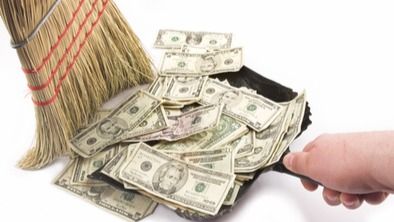
The First Step to Cleaning Up Your Finances
A few years before starting Consumerism Commentary, I realized I was in a financial predicament. The salary I had been earning from my non-profit job was barely paying this bills in addition to the cost of commuting to the said job. I was relying more and more on my credit card to get by, ignoring obligations like my student loans.
A confluence of Bad Events led me to the conclusion that I could not continue along this path forever, so I forced myself to make some changes. I got serious about finding a new job. I wanted to teach — the starting salary would likely e better than what I was earning at the non-profit — but the timing was bad and I needed to find a job in the meantime.
I stopped driving and moved in with my father, a few blocks from a train station, and found a temporary job in the city down the line. It turned out to be a good opportunity, working for the Chief Operating Officer of a major financial corporation. I put off the idea of teaching for a while.
I used my free time to organize my personal finances. Without having to pay for rent, I was able to pay off debt and start saving. They keys to all this organization were “waking up” by starting to pay attention to my money rather than closing my eyes, not knowing how much was incoming and outgoing, and hoping for the best.
To start paying attention, I downloaded MoneyDance, which at the time was free software for managing your money. I started entering my accounts into the software and tracking my income and spending. The ability to visualize what was going on provided me with some motivation for improving my condition.
People ask me what my favorite piece of financial advice is, and I always come back to this point of my life. I really believe that once I opened my eyes to what was going on and stopped hiding from my condition, the best thing for me was tracking my finances in MoneyDance, followed soon by Microsoft Money, and later Quicken.
Even if you don’t use software, and start using a pencil and paper to keep track of all the money you spend, I guarantee you’ll find that there’s something you can spend less money on. Every choice you make when handling your money, whether good or bad, will be recorded and impossible to ignore. Eventually, if you look at the data enough, you’ll want the good choices to outnumber the bad.
Here are some tools for tracking your financial condition.
Software: Intuit Quicken, Microsoft Money, Moneydance, GnuCash (now featuring a stable version for Windows XP/Vista)
Spreadsheets: Income and expenses, balance sheet
Budgeting: Mvelopes, You Need a Budget
Calculators: Financial Calculators from Dinkytown, Motley Fool Calculators


Article comments
Mandi: That’s an interesting comment and question. As far as interesting blogs go, take a look at pfblogs.org and you’re bound to find a blogger in that position.
Ok, you’re fiscally responsible, saving and investing for retirement. That’s how it was for me after I came to the realization that I wasn’t making any headway. I wasn’t an outrageous spender, I only paid a tiny bit for shared cable for example, but I wasn’t making any headway.
Not all problems can be solved simply by spending less. Since I was already spending less, I was lucky in that I could eliminate my rent payments for four months — but other than that, I got a bigger salary and — though I didn’t know it at the time — laid the groundwork for significant “side business” income.
I read your blog a few times a month. Sometimes I learn something new and sometimes I just walk away impressed by the amount of money you have. Seriously.
As a person that has never had much money, I am incredibly conscious of every penny. (When you don’t have a lot, you have to be careful with what you do have.) But here’s my question, where are all the blogs for people that actually have money problems? Sure, I’ve read the stories about people with kids and bills up to their eyeballs but they’re all in trouble for stupid reasons (credit card debt, costly bills for things they don’t need [cable, big fancy cars, gym memberships, etc.], or stupid excessive spending on little things like eating lunch out every day). I avoid all of those things. I don’t have cable, have the cheapest internet service I can get, go out to eat maybe once a month, and generally conserve. I try to be as fiscally responsible as possible…contributing to my retirement and maxing out my company’s matching contributions, having a modest weekly allowance, and saving everywhere I can. So I guess my question is, have you come across any blogs that focus more on people that are fiscally responsible but that are–unfortunately–not gifted with an abundance of money from which to build up an emergency fund, savings, or holdings? So much of what I read is about people that can solve their problems just by being conscious of their frivilous spending and then stopping it. I’d be interested to read more about situations that cannot be rectified that easily.
At least you realized that you were getting into a predicament. I would say that a lot of people would simply start to look for another job while applying for additional credit.
Having the ability to take a step back, evaluate your situation and make corrections is a very important skill to have and it’ll help with more than just finances.